Description
Efnisyfirlit
- Cover Page
- Title Page
- Copyright Page
- Dedication
- Preface
- Acknowledgments
- Contents
- 1. Sustainable Engineering
- Introduction and Objectives
- 1.1 Sustainability
- 1.1.1 Sustainability Dimensions
- 1.1.2 Sustainability Science
- 1.1.3 Sustainability Strategy
- 1.1.4 Environmental Impact Formulation
- 1.2 Resilience
- 1.3 Agility
- 1.4 Integrated Sustainability, Resilience, and Agility Management
- 1.5 Why Sustainability Matters?
- 1.6 Sustainable Engineering
- 1.6.1 Sustainable Engineering Principles
- 1.6.2 Sustainable Engineering Techniques
- 1.6.3 Environmental Sustainability
- 1.6.4 Economic Sustainability
- 1.6.5 Societal Sustainability
- 1.6.6 Process Intensification and Sustainability
- 1.6.7 Energy Analysis and Sustainability
- 1.6.8 Artificial Intelligence
- 1.6.9 Views Regarding Sustainable Engineering
- 1.7 Sustainable Engineering: Energy Analysis, Artificial Intelligence, and Process Intensification
- 1.8 United Nation Sustainable Development Goals
- Nomenclature
- Problems
- Research Projects
- References
- 2. Environmental Sustainability
- Introduction and ObjectiveS
- 2.1 Environmental Sustainability and its Context
- 2.2 Natural Earth Cycles
- 2.3 Greenhouse Gases
- 2.3.1 Carbon Tracking
- 2.4 Ecological Footprint
- 2.4.1 Climate Change
- 2.4.2 Environmental Burden
- 2.4.3 Global Warming Potential
- 2.4.4 Acidification
- 2.4.5 Ozone Formation and Destruction
- 2.4.6 Smog Formation
- 2.4.7 Human Health
- 2.4.8 Toxicity
- 2.4.9 Eutrophication
- 2.4.10 Habitat Destruction
- 2.4.11 Resource Depletion
- 2.4.12 Particulate Matter
- 2.5 Carbon Capture
- 2.6 Decarbonization
- 2.7 Carbon Utilization
- 2.8 Environmental Cost of Carbon Emissions
- 2.8.1 Environmental Impact Assessment
- Nomenclature
- Problems
- Research Projects
- References
- 3. Economic Sustainability
- Introduction and Objectives
- 3.1 Economic Sustainability
- 3.1.1 Energy Return on Investment
- 3.1.2 Renewable Energy Cost
- 3.1.3 Levelized Cost of Electricity
- 3.2 Circular Economy
- 3.2.1 Circular Economy and Sustainability
- 3.3 Bioeconomy
- 3.3.1 Important Aspects of Bioeconomy
- 3.3.2 Waste Management
- 3.3.3 Economic Assessment of Biofuels
- 3.3.4 Bio Break Model
- 3.3.5 Bioeconomy and Circular Economy
- 3.4 Green Economy
- 3.5 Hydrogen, Ammonia and Methanol Economy
- 3.5.1 Methanol and the Environment
- 3.5.2 Methanol Economy versus Hydrogen Economy
- 3.6 Economic Cost of GHG Emissions
- 3.6.1 Index of Ecological Cost
- 3.6.2 Ecological Cost
- 3.7 Thermoeconomics
- 3.7.1 Technoeconomic Analysis
- Nomenclature
- Problems
- Research Projects
- References
- 4. Societal Sustainability
- Introduction and Objectives
- 4.1 Societal Sustainability
- 4.1.1 Societal Well-Being
- 4.1.2 Social Responsibility
- 4.1.3 Advancing Social Sustainability
- 4.1.4 Human Development Index
- 4.2 Social Investment
- 4.2.1 Energy Return on Investment Society
- 4.3 Social Cost of Carbon Emissions
- 4.3.1 Health Effect of Biofuels
- Nomenclature
- Problems
- Research Projects
- References
- 5. Sustainability Metrics
- Introduction and Objectives
- 5.1 Sustainability Impact and Indicators
- 5.1.1 Ecological Indicators
- 5.1.2 Sociological Indicators
- 5.1.3 Technological Indicators
- 5.2 Sustainability Indices
- 5.3 Sustainability Metrics
- 5.4 Human Development Index
- 5.5 Sustainability Assessment Tools
- 5.5.1 Energy Assessments
- 5.6 Case Study: Sustainability Assessment of Hydrogen Production from Solid Fuels
- Nomenclature
- Problems
- Research Projects
- References
- 6. Process Intensification
- Introduction and Objectives
- 6.1 Process Intensification
- 6.1.1 Process Intensification Fundamentals
- 6.1.2 Process Intensification Principles
- 6.1.3 Process Intensification Domains
- 6.1.4 Process Intensification Strategies
- 6.1.5 Process Intensification Techniques
- 6.1.6 Implementation of Process Intensification
- 6.1.7 Operability of Intensified Processes
- 6.1.8 Intensification Factor
- 6.2 Intensification Methods and Modeling
- 6.2.1 Thermodynamic Method
- 6.2.2 Thermodynamic Analysis
- 6.2.3 Industry I4.0
- 6.2.4 Six-Sigma Analysis
- 6.3 Intensification in Units
- 6.3.1 Advanced Separation Systems
- 6.3.2 Advanced Reactors
- 6.3.3 Reactor and Separators
- 6.3.4 HiGee Technology
- 6.3.5 Crystallization Equipment
- 6.4 Intensification in Plants
- 6.4.1 Modular Manufacturing
- 6.4.2 Heat Integration
- 6.4.3 Optimization
- 6.4.4 Process Synthesis
- 6.5 Biochemical Processes and Bioproducts
- 6.5.1 Biopharmaceutical Processes
- 6.5.2 Biotechnology
- 6.5.3 Bioproducts
- 6.6 Chemical Processes
- 6.6.1 Fischer-Tropsch Synthesis
- 6.6.2 Methanol, Ammonia and Hydrogen Production
- 6.7 Thermochemical Processes with Chemical Looping Systems
- 6.7.1 Thermochemical Processes
- 6.7.2 Chemical Looping Systems
- 6.7.3 Hydrothermal Conversion
- 6.8 Green Engineering Processes
- 6.8.1 Biorefinery
- 6.8.2 Fermentation
- 6.8.3 Anaerobic Digestion
- 6.9 Energy Technology and Management
- 6.9.1 Energy Technology
- 6.9.2 Energy Management
- 6.10 Process Safety
- 6.11 Process Intensification and Sustainable Engineering
- Nomenclature
- Problems
- Research Projects
- References
- 7. Energy Analysis
- Introduction and Objectives
- 7.1 Energy Production
- 7.1.1 Nonrenewable Energy Production
- 7.1.2 Renewable Energy Production
- 7.1.3 Implications of Energy Use
- 7.1.4 Energy Production Assessments
- 7.2 Energy Conservation
- 7.3 Energy Conversion
- 7.3.1 Energy Efficiency
- 7.3.2 Energy Efficiency Standards
- 7.4 Energy Storage
- 7.4.1 Energy Storage Types
- 7.4.2 Energy Storage Applications
- 7.5 Energy Economics
- 7.6 Energy Analysis
- 7.6.1 Energy Targets
- 7.6.2 Energy Integration
- 7.6.3 Exergy Analysis
- 7.7 Food, Energy, and Water System
- 7.8 Life Cycle Analysis of Energy Systems
- 7.9 Energy Analysis and Sustainability
- 7.9.1 Energy Analysis and Process Intensification
- 7.9.2 Energy Analysis and Artificial Intelligence
- 7.10 Case Studies
- Nomenclature
- Problems
- Research Projects
- References
- 8. Artificial Intelligence
- Introduction and Objectives
- 8.1 Industrial Artificial Intelligence
- 8.1.1 The Constellation of Artificial Intelligence
- 8.1.2 Artificial Intelligence and Analytics
- 8.1.3 Opportunities and Challenges of Digitization
- 8.1.4 The Industrial AI Readiness Checklist
- 8.1.5 Execution of Industrial AI
- 8.1.6 Agility and Digitalization
- 8.1.7 Challenges with Industrial Artificial Intelligence
- 8.2 Information System Engineering
- 8.2.1 Information Quality
- 8.2.2 Information and Data Management
- 8.3 Digital Industry Platforms
- 8.3.1 Smart Sensors
- 8.3.2 Hybrid Artificial Intelligence Systems
- 8.3.3 Digital Twins
- 8.3.4 Industry 4.0
- 8.3.5 Industrial Internet of Things
- 8.3.6 Multi-Dimensional Optimization
- 8.3.7 Event Agent
- 8.3.8 Self-Optimizing Plants
- 8.4 Cybersecurity
- 8.4.1 Cyber Threats
- 8.4.2 Cybersecurity Response
- 8.4.3 Cybersecurity Training
- 8.5 Artificial Intelligence and Process Intensification
- 8.5.1 Industrial PI4.0
- 8.5.2 Challenges of Application of Industry PI4.0
- 8.6 Artificial Intelligence and Sustainable Engineering
- 8.6.1 Sustainability from Knowledge Creation
- 8.6.2 Data Sources
- 8.6.3 Turning Data into Action
- 8.6.4 Workflow Process
- 8.6.5 Sustainability Focus
- 8.6.6 Sustainable Artificial Intelligence
- 8.6.7 Process Intensification and Artificial Intelligence Applications
- 8.7 Case Studies
- Nomenclature
- Problems
- Research Projects
- References
- 9. Workforce in Sustainable Engineering
- Introduction and Objectives
- 9.1 Key Competencies and Skills in Sustainability
- 9.1.1 Equity, Diversity, and Inclusion
- 9.1.2 Environmental, Social and Governance
- 9.1.3 Equity, Diversity, and Inclusion in the Industrial Sector
- 9.1.4 Work Ethics
- 9.1.5 Skills for Sustainability
- 9.1.6 Workforce with Sustainability Strategy
- 9.2 Education for Sustainable Engineering
- 9.2.1 Required Topic Areas for Engineering Sustainability Education
- 9.2.2 Sustainable Resources
- 9.2.3 Sustainable Processes
- 9.2.4 Increased Efficiency
- 9.2.5 Reduced Environmental and Ecological Impact
- 9.2.6 Addressing Other Sustainability Facets
- 9.3 Training in Manufacturing
- 9.3.1 Mentoring in Industry
- 9.3.2 Diversity Training
- 9.3.3 Training in Energy Management
- 9.3.4 Cybersecurity Training
- 9.3.5 Training in Energy Analysis
- 9.3.6 Training in Process Intensification
- 9.3.7 Training in Artificial Intelligence
- 9.4 Workforce Soft Skills
- 9.4.1 Soft Skills in Energy Analysis
- 9.4.2 Soft Skills in Process Intensification
- 9.4.3 Soft Skills in Artificial Intelligence
- 9.5 Workforce and Digital Transformation
- 9.5.1 Connected Workforce
- 9.6 Sustainable Engineering Curriculum with Process Intensification and Artificial Intelligence
- Nomenclature
- Problems
- References
- Index
- About the Authors






Reviews
There are no reviews yet.